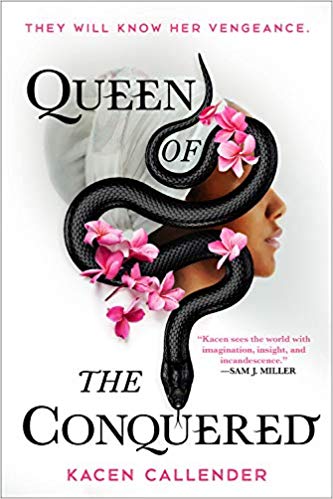Sigourney Rose is a survivor. Not only does she survive the massacre of her family as a child, but she ends up ruling over people dark skinned people who look just like her. Early on in these pages, the reader experiences her making the hard choices that inspire no love from her people. After an attempt on her life, she becomes very aware of exactly how despised she is as an islander with power kraft (magic) and status among fairer skinned rulers. She’s invited to the island Hans Lollike Helle to have an audience with the ruler Konge Valdemar, who’s deciding on his successor. But nothing is what it seems on Hans Lollike as bodies start to pile up and the double crossing is something reminiscent of Game of Thrones. But the comparison ends there, as Sigourney’s world delves into colonialism, racism, and colorism.

The effects of colonialism in present day have come to the forefront of many conversations. This novel t to explore these colonialism in a new way while putting the spotlight on nuances. Not only is the author from the islands but is well versed in the psyche of characters searching within themselves for who they are. Kacen Callender is from St. Thomas, and has multiple books published in different genres and age ranges, many focusing on their home: Hurricane Child and, King and the Dragonflies are (Middle Grade); This is Kind of an Epic Love Story and, Felix Ever After are (Young Adult); and now Queen of the Conquered is their first adult novel.
This work is incredibly original. With more and more fantastical narratives being published by POC with POC protagonists, this narrative is a continuance of the greatness of these stories. The island setting pays homage to the author’s background while setting itself apart from other African Diaspora plots.
I was enamored with this narrative from the first pages. Callender understands humans and words on a deep level. The prose began stealing my breath when I ran of Sigourney’s escape, “I ran, salt drying on my cheeks and nose. Guilt that I hadn’t done anything to save them tightening around my neck. Most days I find that I still can’t breathe.” Callender provides all the complexities of the human experience in one novel. There’s conflicting emotions within characters, conflicting desires amongst characters. There are scenes that are just heart wrenching while being so beautifully written you can’t look away. The two characters who stood out the most to me were Sigourney and her caretaker Marieke. I love that this isn’t an origin story (though we learn Sigourney’s origins). There’s a special place in my heart for characters who already know who they are while being open to evolution. I loved how some moments she was cold and calculating but then we got to see her waver in her mission and even contemplate giving up without actually doing so. Marieke is the only free woman in her circle after Sigourney freed her. She was a dutifully servant yet still behaved with dignity and grace, and was a perfect motherly stand in who assisted in Sigourney’s story. However, although the characters had motives and desires which pushed their actions, none of them actually evolved. That was something I found myself struggling with. Considering the type of plans in place, I understand why this was necessary for the plot; however, I feel that growth, not just accomplishing a goal or failing, is necessary to the character arc.
The plot is very intentional and paced very evenly. Everything happened as it needed to. This allowed the reader to understand what’s happening and where their place and time is, especially when jumping forward or backward in time. Callender used Sigourney’s kraft, telepathy, to explain the other characters and motivations. In the hands of a less experienced author this could come off gimmicky but here, Callender effortlessly moves the plot. And the twist is so unexpected yet perfectly set up, you’ll literally have that moment where you just have to pause and say, “what?”
For the most part, I loved this novel. I enjoyed the complexities and the characters’ humanity; however, I just felt sorrow the entire time. Though this fits the narrative, there were moments where my soul just ached, and no reprieve came. The strongest joy I recall was that of Aksel and his childhood love Beata. Though there’s slivers of happiness, they’re dashed pretty quickly. Beata is killed, Marieke’s husband and child are murdered, and even the girl Malthe once loved just disappears. I understand the need to show the darker edges of the human experience but I would have loved to tasted just a bit more sweetness with my bitter sorrow. But, the most joy comes in the prose, flashes of light and love in this brush of craft used to paint this picture.
